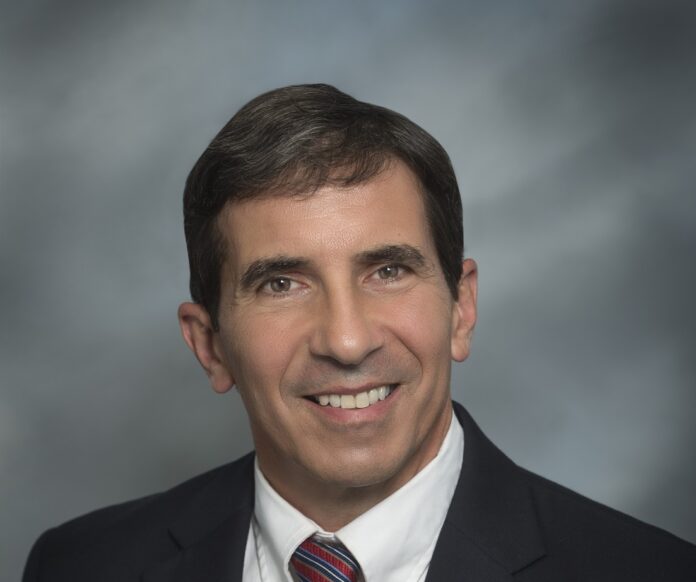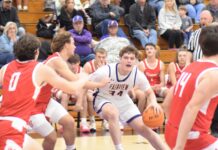CULLMAN, Ala. – February is National Cancer Prevention Awareness Month, a time dedicated to promoting the importance of early detection and prevention of the disease. Dr. Michael M. Garcia with the Clearview Cancer Institute in Cullman sat down with The Tribune to discuss things everybody should be doing.
Clearview Cancer Center has been in Cullman now for two years and is one of seven satellite offices of the main campus in Huntsville. Garcia has practiced in the Jasper satellite office for 25 years and now splits his time between Cullman and Jasper.
“We are promoting cancer prevention and we have literature that tells patients the best ways to prevent malignancy from occurring,” he said. “If we were able to follow just common sense guidelines and stick with them, you could prevent one-third to one-half of all the cancers that we see, which is pretty amazing.”
Garcia advised:
Don’t smoke or use tobacco, including smokeless tobacco. As for vaping, he said, “The jury is still out. We haven’t had enough time. It took years and years and years before the data, and of course the tobacco industry fought us for years to hide the fact that tobacco causes cancer. It appears that vaping might be a little bit safer, but I don’t think we know enough yet to say.”
Maintain a healthy weight and a healthy diet. “Especially in the South, we tend to be obese. That is way and above the national norm. In the bigger cities where people walk and commute, they tend to have lower rates of obesity. Obesity is a big risk factor for several cancers,” Garcia said.
He added, “Eating too much ham or eating too much meat is bad and puts you at risk for colon cancer or stomach cancer…the nitrosamines and nitrates in ham- and I am guilty of that, too.”
Garcia said consuming large amounts of processed foods is not good for the body.
Other diet dos and don’ts include:
- Eat plenty of fruits, vegetables and whole grains.
- Avoid alcohol or drink in moderation.
- Reduce saturated fats and refined sugars.
Exercise regularly. Garcia suggested, “(Get) 20 or 30 minutes of exercise- it doesn’t have to be vigorous- but if you aren’t going to do vigorous exercise, you should go a little bit longer each time- 3 to 5 days a week- and you should incorporate that into your lifestyle. It is a change of lifestyle and when you do exercise, you don’t eat as much, and it can curb your appetite, so you tend to eat better and make better choices.”
He said exercise is not only good for cancer prevention but also longevity.
Get vaccinated. Garcia said, “We need to be sure to get vaccinations for hepatitis and for HPV (human papillomavirus). Hepatitis is a risk factor for liver cancer and HPV is a risk factor for cervical cancer and head and neck cancer. Then COVID! Just throw in the COVID vaccine because we need to vaccinate the world.”
He added, “Most of the cancer patients in my clinic are older and they have shut themselves in, which helps prevent COVID, but as far as their mental health, it can’t be good for their mental health.”
Get screened. Cancer screenings and early detection are crucial, said Garcia, who believes COVID-19 has had an effect on the number of people receiving screenings.
“I read in one of my journals this past week,” he said, “in the past year and since COVID in 2020, the number of screenings and preventative cancer screenings- breast cancer, colon cancer, cervical cancer and all those screenings and testing- has decreased by almost 80%. If we don’t get rid of COVID, in two to three years you are going to see a rise in all these cancers because of the lack of screening tests, or you are going to see the instance of later cancers which are more difficult to treat and cure.”
Who needs to be screened? Garcia said screenings have the most benefit before symptoms appear, especially for people 50 or older and those with family histories of cancer. “Once a man or woman hits age 50, that’s where your cancer risk tends to become more prevalent. If you have a first-degree relative who has a malignancy, they usually move that (recommended age) down 5-10 years.”
The doctor urges everyone to see their health care providers regularly and be honest. Have conversations about cancer screenings.
He also recommends young men be screened for testicular cancer, saying, “They should feel for masses when they shower every day. That is the one cancer that really in men, starts at an early age. Then, if you have any lumps or bumps or moles, especially here in the South, any lesion on your skin that grows or has irregular borders or different colors, those should at least be looked at.”
The doctor said there is some encouraging news when it comes to cancer screenings, especially regarding lung cancer.
“They have just approved in the past 2-3 years the CT scans for early detection of lung cancer. Insurance companies finally agreed that if we can catch a lung cancer earlier, you might actually save money, so that’s beneficial for them,” he said. “We were doing routine chest x-rays for years, and that never did show that it improved the chances of early detection. Since they’ve started low-contrast CT scans, anyone who has more than 20-30 years of smoking, even if they have quit 4-5 years earlier, they can be screened now for a yearly CT scan that is low radiation so you aren’t putting the patient at risk. They have shown that has dropped the mortality from lung cancer and increased early detection.”
Other good news is advancement in immunotherapy. Said Garcia, “Immunotherapy is the backbone of the treatment and researchers are trying to add to the effectiveness of that therapy.”
Clearview Cancer Institute of Cullman has reduced the need for cancer patients to travel out of town for treatments.
Garcia said, “The advantage of us being here in the community is that they have access to all the things that are available in Huntsville. It can be done here. We do molecular testing on cancers looking for mutations so patients might be able to receive what we call targeted therapy. We have a genetic counselor, who is in our Huntsville office, but we do tele-medicine now with patients. Anyone who has a suspected family history of cancer, such as one of the breast cancer mutations we look for, she can do an interview with the patient and their family and give them recommendations and we can follow through with those recommendations. That’s something I had never had available to me and it’s really nice.
“We can give all the treatments, any chemotherapy and all the immunotherapy drugs that are now being used in cancer that have been the big advances in the past five years. We have access to all of that.”
Clearview Cancer Institute is Cullman is located at 1948 Alabama Highway 157, Professional Building I, Suite 380, Cullman, AL 35058. Learn more at www.clearviewcancer.com.
Copyright 2021 Humble Roots, LLC. All Rights Reserved.



























